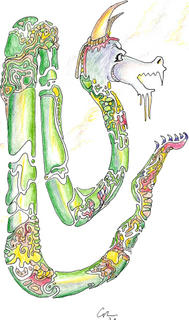Psychotic Episode, No.34, Vol.3
The Easter Bunny and His Friends
The world can be strange and confusing place, populated with all manner of non-existing "things". It may well be that most of what we so casually refer to as real, is merely a linguistic convention. We may know that what we are talking about does not actually exist but we talk about it anyway simply so we have something to talk about. I think myths are like that. We intend them to be explanatory in some way, to inform or enlighten yet without taking the myth itself seriously. Even so, we get confused sometimes and forget that the myth is only a means to some other end.
I could, for instance, talk at great length and in excruciating detail about Unicorns as if they actually existed. In fact there people who have written entire books on just that. Yet I know that I'm talking about something that does not exist and probably never has. The non-existence of "things" is no real impediment to conversation and certainly not to scholarship. Yet there are those who will understand a Unicorn as not only a symbol of something else, but as having actual existence, if not now then in some long lost Golden Age at the beginning of time. I kind of like the imagery. It describes a world that I would enjoy far more than this one and it would be so much easier to determine the rightness and wrongness of things. Alas, the universe is supremely indifferent to what I like. The imagery is all I can have.
 | While I feign a kind of superiority here, as if I, at least, am above being seduced by my delusions, I don't believe it. I am just as tempted as anyone else by the lure of a perfect world and the strength of my desire for escape is powerful. It's just that I've become cynical. I can't let myself believe in much of anything however much I want to. It's an odd dichotomy: on the one hand I know that most of what I most want to believe is just frivolous nonsense and, on the other, the desire to believe is a deep compulsion of great power. If little kids can do it, why can't I? |
I think I like the idea that dragons are really a dim memory of dinosaurs but I'm told that the great beasts were exinct long before there were people to fear them. Being familiar with the arguments put forth for that view, I can find enough holes to at least admit the possibility of our co-extence with the Thunder Lizards. Besides, it's enjoyable to imagine a world that is incredibly alien and strange.
Did our most ancient ancestors just make stuff up to amuse themselves or were their tales a clumsy attempt to descibe their reality? If these first humans were truly human then they would have possessed the same raw intelligence as humans today and that would imply that they were capable of thought. If reason is a necessary component of thought, they must surely have understood the difference between empirical reality and mere fantasy. In fact, inventing strangeness and fear in their intellectual landscape would be counter productive; the world would have been scary enough without making stuff up.
While I remain mostly cynical and am skeptical of every assertion of every kind about everything, I still enjoy the possibility that the certainty we are so certain about may be yet another self-delusion. Our smug pretense of knowledge may nothing more than our remedy for a fear of the unknown. Wrapped in our security blanket of omniscience, we whistle in the dark, hoping the dark doesn't whistle back.
Most of what we claim to be certain of is a transitory mythology. We hold some description of events and things to be "true" for a while and then we move on to some other, more complete description. The old descriptions influence us in our decisions and then are replaced by new ones and forgotten. We then adapt the decisions made on "flawed data" of the earlier description to agree with the new, improved descriptions. Our mythology is in constant flux and can't endure for even a single generation. If we stumbled across an Absolute Truth we wouldn't have to resort to mythology at all but the fact that facts are infinitely malleable ensures that there will always be myths. Myths fill in the gaps and provide explanations until replaced by an upgraded version. Not a very stable trajectory for an increase in knowledge.
The reason I mention all this is not to diminish your confidence in the knowledge you believe you have acquired; that knowledge is real after all. The point is that the "things" we think we know may not exist so that knowing about them doesn't gain us much. Additionally, our knowledge is mostly about what others have said about what they think they know. The knowledge we claim to possess is not even our own and is so far removed from the object of study that we are wholly dependent on the competence and integrity of the original investigators. We have to believe someone else to tell us what is real. We have to trust the whole apparatus of education and have faith in those who teach us. This seems like fertile ground for the creation of imaginative myth and empty knowledge. While your knowledge does really exist, it may well be without empirical content.
To Go Back, Click Here


